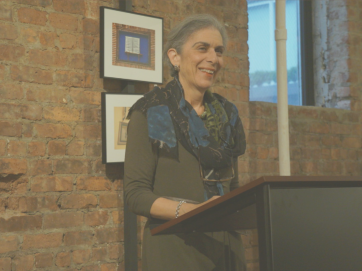This article originally appeared on The Huffington Post on April 25, 2014.
Godzilla is about to re-emerge from the oceanic depths, this time to wreck 3D havoc on San Francisco.
Monsters as we all know are merely metaphors. As Freud taught us, they are the Id let loose upon the world. Or as Jung taught us, they are archetypes reemerging from the mists. Or as cultural studies departments have taught us, they are personifications of Cold War anxieties, consumerist appetites, climate change dread, or other social and political fears.
The new Godzilla, arrives with a murky trailer that suggests that heartless, over-reaching scientists are somehow to blame. Godzilla is now three times as tall as the 160-foot dinosaur who first stomped across the screen in 1954. Along with the monster's increased physical stature comes a restoration in "seriousness." At least so says the director Gareth Edwards, who sought to recapture the moral urgency of the original, which he believed has dwindled over the years of camp sequels and re-makes.
Godzilla first splashed ashore on Odo Island in Ishiro Honda's black and white movie as Japan was still recovering from the devastation of the war. At nearly the same time on the other side of the world, Samuel Beckett's two-act Waiting for Godot debuted in Paris—in January 1953 at the aptly named Théâtre de Babylone.
Godot, of course, was no monster, but Godzilla and Godot have more in common than a first syllable. They are the two opposing faces of despair: a god that is pure wrath and a god that never shows up. Both emanate from the devastation of World War II. Godzilla is an ancient creature scarred by atomic radiation and driven to his rampage by nuclear testing. Those details are decorously omitted in the drastically re-edited American version in which Raymond Burr is bizarrely spliced into the action: Godzilla, King of the Monsters (1956). Godot sustains the hopes of Vladimir and Estragon, the querulous pals who pass the time in the play's barren, existential landscape. Godzilla is all noise, from thunderous footfall to his metallic scream. Godot is entirely silent except for a cryptic message sent by a boy at the end of each act. When Vladimir asks the boy what Godot does, he answers, "He does nothing, sir."
If we had to choose between these two worlds, which would be better? The dread of sheer destruction let loose upon humanity? Or the dread of meaninglessness in an indifferent universe? Which is worse, malevolence or void? W. H. Auden commented in a late poem:
But indifference is the least
We have to fear from man or beast.
The terror of a universe that takes notice of us with active dislike seems to strike most people these days as the more unsettling alternative. Our cinematic nightmares are populated with menaces such as zombies, vampires, ravenous aliens, killer clowns, and really big critters, and not so much with Pinteresque non sequiturs and hopeless stares into the empty horizon. There was, of course, Lost in Translation. But the Godot-dämmerung isn't filling up the cineplex these days.
My stock-in-trade is writing about higher education. As head of the National Association of Scholars that is pretty much all I do, day in and day out, and I write from the perspective of someone committed to traditional academic values, such as the rational search for truth. In other words, I'm as good a candidate as one might find for the Godot side of the equation: a connoisseur of hopeless waiting for something that will probably never arrive.
And yet really I am on the side of the monsters, at least the big tail-dragging ones with large underbites. They seem so sadly out of place in a universe designed for smaller things, and their rage is so unequal to the perplexities of the world. Godzilla may tower over the TransAmerica Pyramid, but he cowers under the Higg's Boson.
As a metaphor he is up for grabs. The current movie probably casts him as nature-defying-the-planet-despoiling-scientists. But, if so, that's just playing along with popular prejudice. I prefer to think of Godzilla as the modern university, grown way too large and unwieldy to live in this world. He is, for sure, mostly appetite and expects us to see to his needs. Why? That's just the way he is. Ferocious, easily peeved, entitled. Godzilla concentrates all the forces of contemporary pantheism, earth-worship, and anti-humanism that are by far the most powerful quasi-religious sentiment on campus. Godot is at best a spokesman for the nouveau atheism that has emerged in recent years with its own "chaplains" on some campuses.
Of course, I don't insist on my interpretation. I am, however, hankering for the epic battle to come: Godzilla vs. Godot. What happens when irresistible existential rage meets immovable existential indifference?













